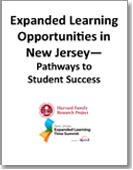The Harvard Family Research Project separated from the Harvard Graduate School of Education to become the Global Family Research Project as of January 1, 2017. It is no longer affiliated with Harvard University.

|
September 23, 2010 Expanded Learning Opportunities in New Jersey—Pathways to Student SuccessPriscilla M. Little |
Article Information
- Full Text (HTML)
- Full Text (PDF: 94 kb)
The notion of when, where, and how children learn is expanding beyond the traditional boundaries of school walls to include a diverse range of learning settings such as afterschool and summer programs and workplace and virtual learning spaces, all of which work in intentional alignment with schools to support student success. Collectively, these approaches are referred to as expanded learning opportunities (ELO).
At their core, ELO approaches share some common interrelated features:
- They recognize that students learn in and out of school classrooms.
- They rethink the use of time across the school day and year to support learning.
- They recognize that no single learning setting will prepare students for success; rather, an integrated approach to learning across the day, across the year, and across a student’s lifetime is required for mastery of a broad set of skills.
Increased investments in afterschool and summer learning over the past decade have resulted in a substantial evidence base about their academic, social, health, and other benefits; the evidence presents a strong case that such non‐school supports are important pathways to learning, particularly when they work in intentional alignment with schools to support student success. Yet, too often, these supports continue to be seen as “add‐ons,” not integral to in‐school education efforts.
This Expanded Learning Opportunities policy brief, prepared for New Jersey After 3’s Expanded Learning Time Summit in September 2010, describes the potential benefits of participation in a range of well-implemented ELO programs and initiatives for students of all ages, including afterschool and summer programming, and underscores the benefits of strong partnerships for learning between schools and out‐of‐school learning supports. It concludes with a set of key policy factors to consider when adopting different ELO approaches.
